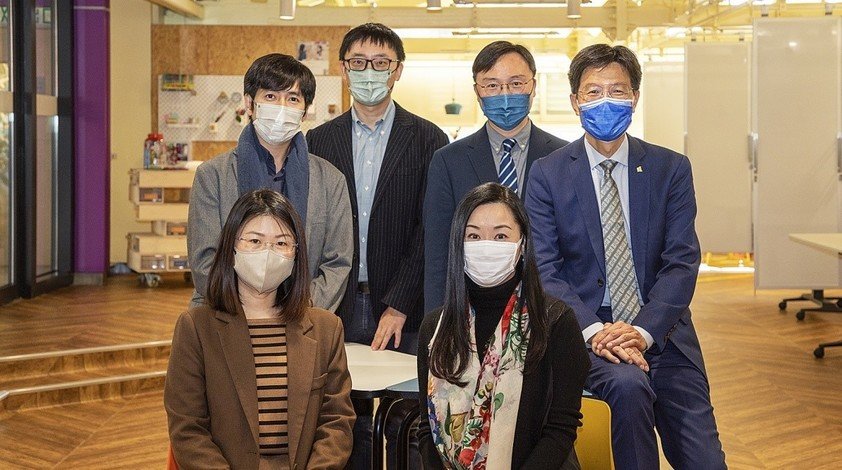discover hkbu
Brand new transdisciplinary programmes to nurture future-ready talent
28 Feb 2022


Transdisciplinary and personalised learning is a global trend in higher education. This is in response to the growing demand for talent who can transcend disciplines to ideate for innovation in different sectors of society. Building the capacity of our city for innovation and technology, and the use of technology in healthcare and the arts and culture, has been on the Government's priority list for enhancing the competitiveness of our economy. To keep up with the changes, development and needs of today's world, HKBU will launch four new transdisciplinary undergraduate programmes in the 2022/23 academic year. The four programmes, each of which has been designed to be unique, share a common goal—to nurture future-ready students with a broad academic foundation and a comprehensive range of unique competencies by integrating science, technology and the humanities, so that students are well prepared not only for their careers, but also the future development of their respective fields.
The Bachelor of Arts and Science (Hons) in Arts and Technology programme, which offers 40 places every year, aims to cultivate innovators who are proficient in art, culture and technology, and it will help them integrate sustainable development and new possibilities in the arts and cultural sectors. Students will learn arts technology theory and practices as well as cutting-edge technologies such as extended reality, immersive media art (e.g. the Metaverse), artificial intelligence and creative robots, and how they can incorporate these technologies into artistic productions and other real-world applications, e.g. non-fungible tokens (NFTs). Students will also have the opportunity to undertake internships, during which they can co-produce events and projects with art professionals. Graduates will be able to apply their experience and knowledge in their future careers across many possible fields such as art production, the art trade, and other creative and emerging art forms.
The Bachelor of Arts (Hons) in Business Administration (Global Entertainment) programme will admit 15 students annually, and it aims to develop versatile and talented future executives for the entertainment and creative industries. The curriculum features a synergistic mix of theories and practical knowledge from the arts, culture and business domains. Students will learn about running an entertainment business, arts funding, digital marketing, and recent fintech developments such as the blockchain and NFTs. Additionally, they will be exposed to subjects such as artiste management, entertainment law and creative entrepreneurship for a better understanding of the relevant industry practices and cultures. Students will also get the chance to do internships with employers in Hong Kong, the Greater Bay Area or other countries to gain real-world work experience. With their unique transdisciplinary advantages, graduates can take up a variety of business careers related to entertainment, innovation, art and culture.
The Bachelor of Social Sciences (Hons) / Bachelor of Science (Hons) in Innovation in Health and Social Well-Being programme, with an annual intake of 30 students, aims to nurture innovators who are knowledgeable about health and social well-being and the integration of technologies (e.g. data analytics and AI) for innovation in service provision and solution development. The students will have early exposure to real-world health and social well-being problems via experiential learning projects and internships. The programme provides two concentrations: "Health and Social Well-being" (HSWB) and "Health Technology and Informatics" (HTI). Students choosing HSWB will specialise in health and social well-being service innovation and obtain a Bachelor of Social Sciences degree. Students choosing HTI will specialise in health technology and informatics innovation and obtain a Bachelor of Science degree. Graduates will be able to develop their careers in NGOs, social enterprises, the Hospital Authority, insurance companies, and technology start-ups where talented graduates with health and social innovation training are in high demand.
The Bachelor of Arts, Science and Technology (Hons) programme is a true novelty. It is unique because of the personalised learning pathway it provides. Under the guidance of professors, students may chart their scope of study and design their own pathway based on their personal interests and aspirations, with access to all HKBU courses. Through guided study, projects, workshops, internships and a diverse array of other outside classroom learning activities, students will develop their independent learning and critical thinking skills, formulate innovative solutions to solve social or global problems, and have the opportunity to put such solutions into practice at industry or community levels. Graduates will be well-equipped for a wide range of possible careers, from engaging in innovation and invention to being an entrepreneur, a researcher or an advocate, through which they can contribute to society.
First-year students of the above programmes will be required to finish the transdisciplinary common core course "Global Challenges". Professors from different faculties will lecture on important global issues and help students understand how different disciplines triangulate and contribute to such issues, and this will enhance students' problem-solving skills, shape their international outlook, and raise their awareness of sustainable development.
"HKBU remains committed to providing our students with the best experience, in order to develop future-ready talent for Hong Kong and the nation," says Professor William Cheung, Associate Vice-President (Undergraduate Programmes) of HKBU.